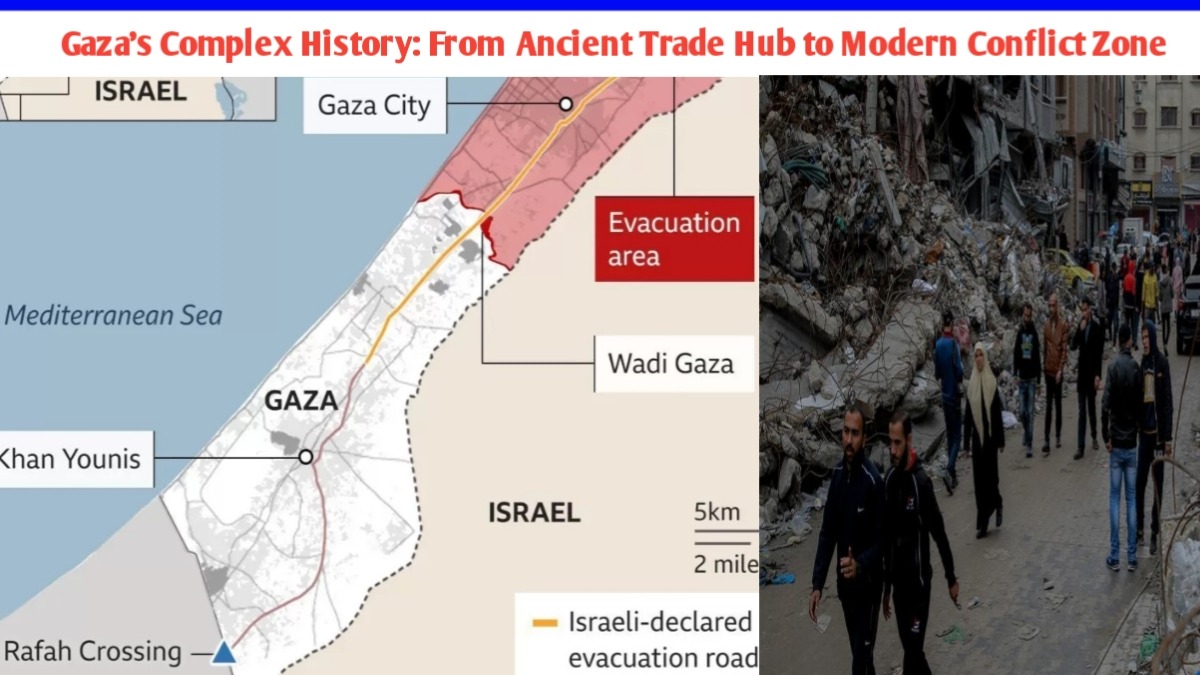Gaza’s Complex History: From Ancient Trade Hub to Modern Conflict Zone
Gaza’s Complex History’
The Gaza Strip, a small but geopolitically significant region along the eastern coast of the Mediterranean Sea, has a history that spans millennia. Its strategic location has made it a focal point of trade, culture, and conflict throughout the ages. Understanding Gaza’s past is essential to comprehending its present challenges and future prospects.
Ancient Beginnings
Gaza’s history dates back to ancient times, with evidence of habitation as early as the Bronze Age. It was an important city in ancient Egypt, serving as a military and trade outpost. During the Philistine era, around the 12th century BCE, Gaza became one of the five Philistine city-states and was frequently mentioned in biblical texts.
The city’s prominence continued under various empires, including the Assyrians, Babylonians, Persians, and Greeks. Alexander the Great conquered Gaza in 332 BCE, integrating it into the Hellenistic world. Subsequently, it became part of the Roman Empire, where it thrived as a major trading hub.
Islamic and Crusader Periods
Gaza’s significance persisted through the Islamic conquests of the 7th century. Under the Umayyad and Abbasid caliphates, Gaza flourished as a center of learning and commerce. The city saw further prosperity during the Fatimid Caliphate until the Crusaders captured it in the 12th century. The Crusader presence was short-lived, as Saladin reclaimed Gaza for the Muslims in 1187.
Reading more… Jessica Alba Leaps Back into Action Mode with ‘Trigger Warning’
Ottoman Era and British Mandate
In the 16th century, Gaza became part of the Ottoman Empire, a period marked by relative stability and economic growth. The Ottomans ruled Gaza for nearly 400 years until World War I, when British forces captured it in 1917. Under the British Mandate, Gaza’s strategic importance grew, and it became a focal point of Arab-Jewish tensions leading up to the creation of Israel.
Modern Era: Conflict and Blockade
The modern history of Gaza is dominated by conflict. After the 1948 Arab-Israeli War, Gaza was administered by Egypt. The Six-Day War in 1967 resulted in Israeli occupation, which continued until the Oslo Accords of the 1990s granted limited autonomy to the Palestinian Authority.
The turn of the 21st century brought further turmoil. The Second Intifada, which began in 2000, led to increased violence. In 2005, Israel unilaterally withdrew from Gaza, but the region’s troubles were far from over. The militant group Hamas seized control of Gaza in 2007, leading to an Israeli and Egyptian blockade that has severely restricted movement and trade.
Humanitarian and Political Crisis
Today, Gaza is often described as one of the most densely populated and impoverished places on earth. The blockade, coupled with recurrent conflicts between Israel and Hamas, has led to severe humanitarian crises. Access to basic necessities such as clean water, electricity, and medical care is limited, and the unemployment rate is among the highest in the world.
International efforts to mediate peace have repeatedly stalled, with periodic escalations in violence causing significant civilian casualties and destruction. The political divide between Hamas in Gaza and the Palestinian Authority in the West Bank further complicates the prospects for a unified Palestinian government and a lasting peace agreement with Israel.
Cultural Resilience
Despite the hardships, Gaza’s residents maintain a rich cultural heritage. The city’s history is reflected in its architecture, cuisine, and traditions. Efforts to preserve and promote Gaza’s cultural identity continue, even amidst the ongoing conflict.
Conclusion
The history of Gaza is a tapestry of ancient civilizations, strategic conquests, and enduring conflicts. From its early days as a bustling trade hub to its current status as a symbol of the Israeli-Palestinian conflict, Gaza’s past shapes its present and will undoubtedly influence its future. Understanding this complex history is crucial for any meaningful discussion about peace and stability in the region.
How did you like the information given in our article today, please tell us in the comment section and for more such posts, follow our page The News House, thank you

